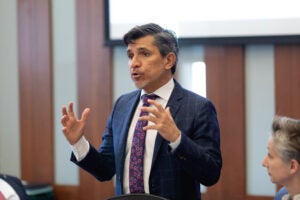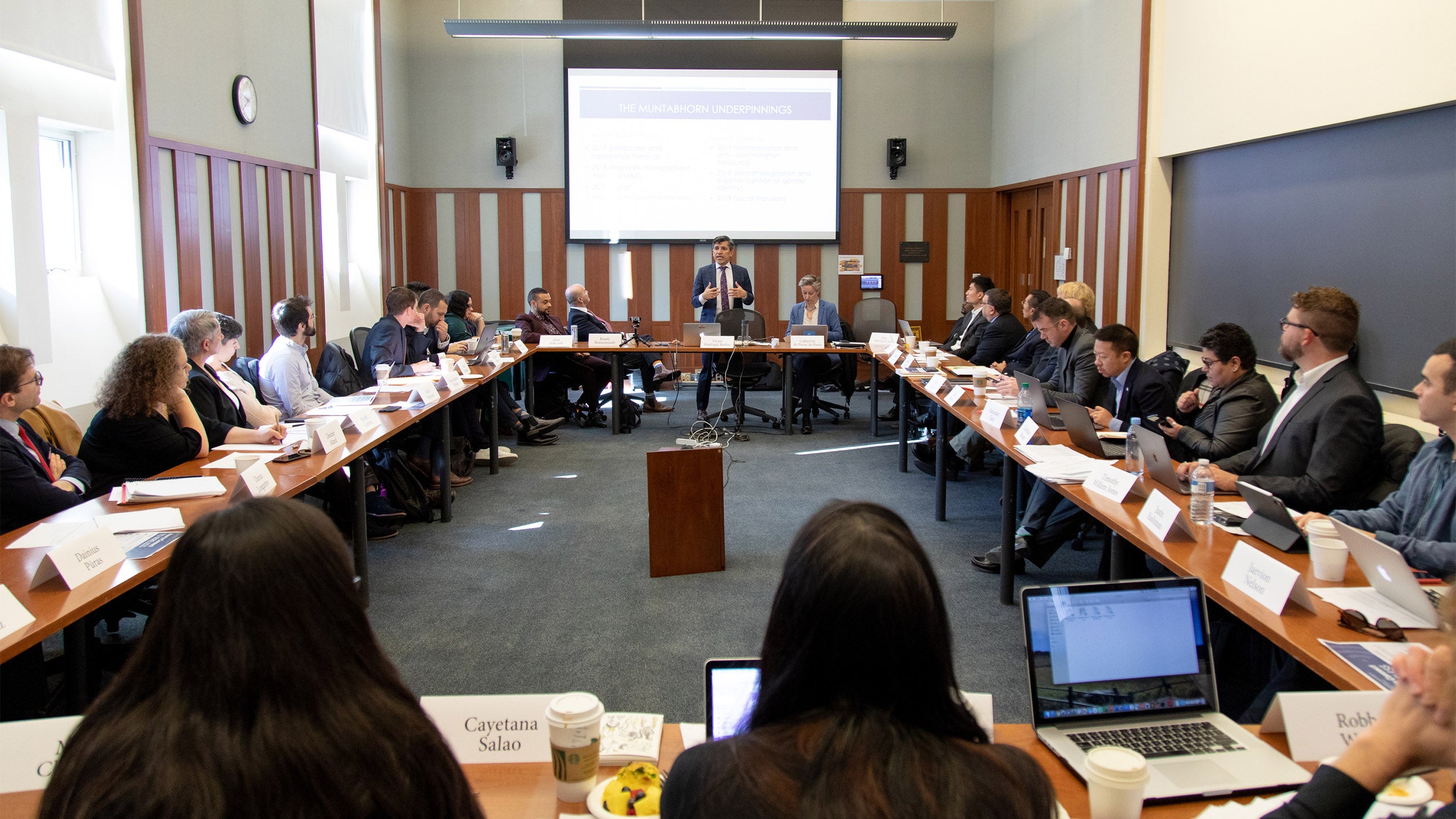The Harvard Law School Human Rights Program welcomed government officials, medical experts, legal scholars, and human rights activists from around the world to Cambridge on Feb. 28 for a global consultation on practices of so-called “conversion therapy” to which lesbian, gay, bisexual, trans and gender diverse persons are subjected around the world. Victor Madrigal-Borloz, the United Nations independent expert on the protection against violence and discrimination on the basis of sexual orientation and gender identity, convened the meeting as part of his U.N. mandate.
“This meeting was extraordinary, with participants sharing their expertise and experience to create the type of multidisciplinary conversation that is essential to deal effectively with human rights issues,” he said. Madrigal-Borloz, who is also the Eleanor Roosevelt Senior Visiting Researcher at HRP, used the expert consultation to gather evidence and feedback ahead of his report to the U.N. Human Rights Council.
Through his U.N. mandate, Madrigal-Borloz is tasked with identifying root causes of violence and discrimination against LGBT persons around the world and with seeking advice from states on measures to tackle these phenomena. “Conversion therapy,” the subject of his current research, is an umbrella term referring to practices ranging from talk therapy to emotion suppression to electrical shocks that aim to change a person’s sexual orientation and/or gender identity.

Credit: Lorin Granger Victor Madrigal-Borloz, United Nations independent expert for the protection against violence and discrimination based on sexual orientation and gender identity (SOGI).
“Such practices are harmful and may cause severe pain and suffering and lead to deep psychological harm, such as depression, anxiety, and suicidal ideation. They have been repudiated by major mental health organizations, U.N. entities and human rights mechanisms,” he said. The report will seek to determine the prevalence and forms of the practice, the social norms, beliefs and systems that underlie it, the consequences on those subjected to it, and the responsibility of states to address it. Leading experts and human rights practitioners, from countries including Australia, Nigeria, Pakistan and Malta, took part in the meeting.
During the third session of the day, Mathew Shurka, who directs the Born Perfect campaign, spoke about his own experiences undergoing conversion therapy over a period of several years. His organization is working to ban the practice throughout the United States, and he encourages survivors of conversion therapy to come forward to help advocate to end the practice.
“Survivors are at the forefront of the movement to end conversion therapy,” Shurka said. “They have changed the hearts and minds of legislators and policymakers by sharing their stories.”
When discussing the range of techniques used in conversion therapy and the variety of harmful effects, Lía Burbano Mosquera, an LGBTQ activist from Ecuador who leads the Mujer & Mujer Foundation, noted that forcing someone to be another person constitutes torture. “The simple existence of conversion therapy increases the chances of suicide in adolescents and young people, and the frustration and abandonment of the personal life project in older adults.”
Jack Drescher, a clinical professor of psychiatry at Columbia University who is widely considered to be one of the world’s foremost experts on sexual orientation change efforts, said: “There is no empirical evidence that conversion therapy works. Because of ample evidence they do harm, conversion therapies are opposed by all mainstream mental health organizations, reminding therapists to first do no harm.”
When discussing stakeholders involved in conversion therapy practices, an activist noted that in Nigeria, conversion therapies are promoted on TV channels, in churches, and on the internet, having been normalized by families and religious bodies. Another participant said that several forms of conversion therapy are being widely practiced in the Asia-Pacific region, with religion and the protection of family honor and prestige used as justification, in turn leading to the implementation of state-sponsored programs.
Also present at the meeting were a number of government officials, including Randy Boissonnault, former MP and adviser on LGBTQ issues to Canadian Prime Minister Justin Trudeau. Boissonnault described a number of measures that the Canadian government has taken to protect LGBTQ minors, including Edmonton, Alberta’s decision to officially ban the practice. The meeting also benefitted from the participation of a number of state’s representatives, including Laurence Vanceunebrock-Mialon, a member of the French parliament, who provided details on her efforts to introduce legislation to ban the practice of conversion therapy nationwide in France.
A number of Harvard affiliates were invited to the meeting, including Alexander Chen ’15, who was recently named director of the law school’s new LGBTQ+ Advocacy Clinic. Responding to presenters, Chen advocated for a ban on the practice, stating that governments have “an elevated responsibility to protect LGBTQ+ youth” who are particularly vulnerable to the practice.
Testimony and evidence from the meeting will inform Madrigal-Borloz’s report on practices of conversion therapy, which will be presented to the U.N. Human Rights Council in Geneva later this spring. In the meantime, Madrigal-Borloz, who described the meeting as a great success, will continue a number of other research projects on global issues related to sexual orientation and gender identity with the support of students and staff in the law school’s Human Rights Program.
